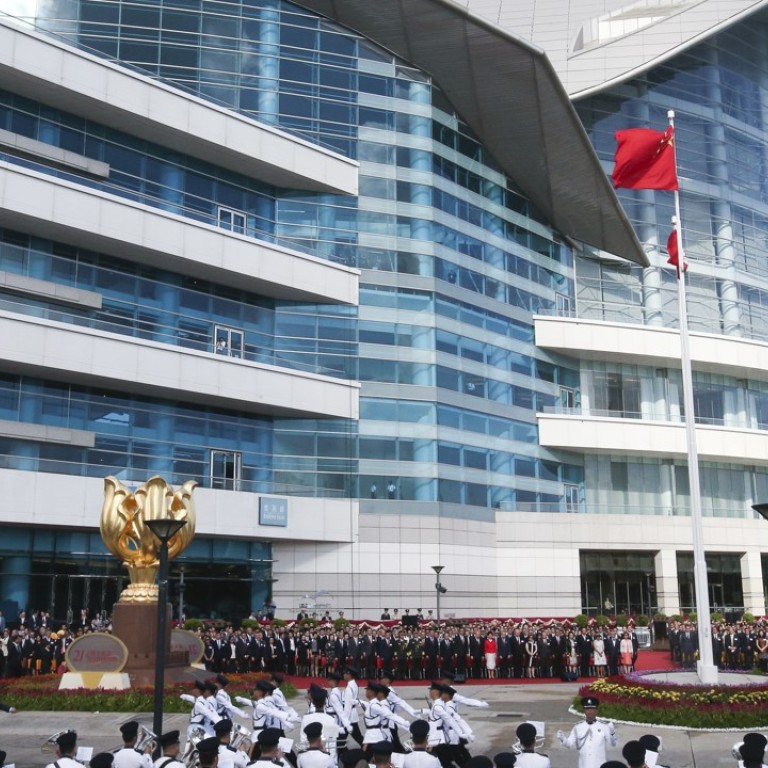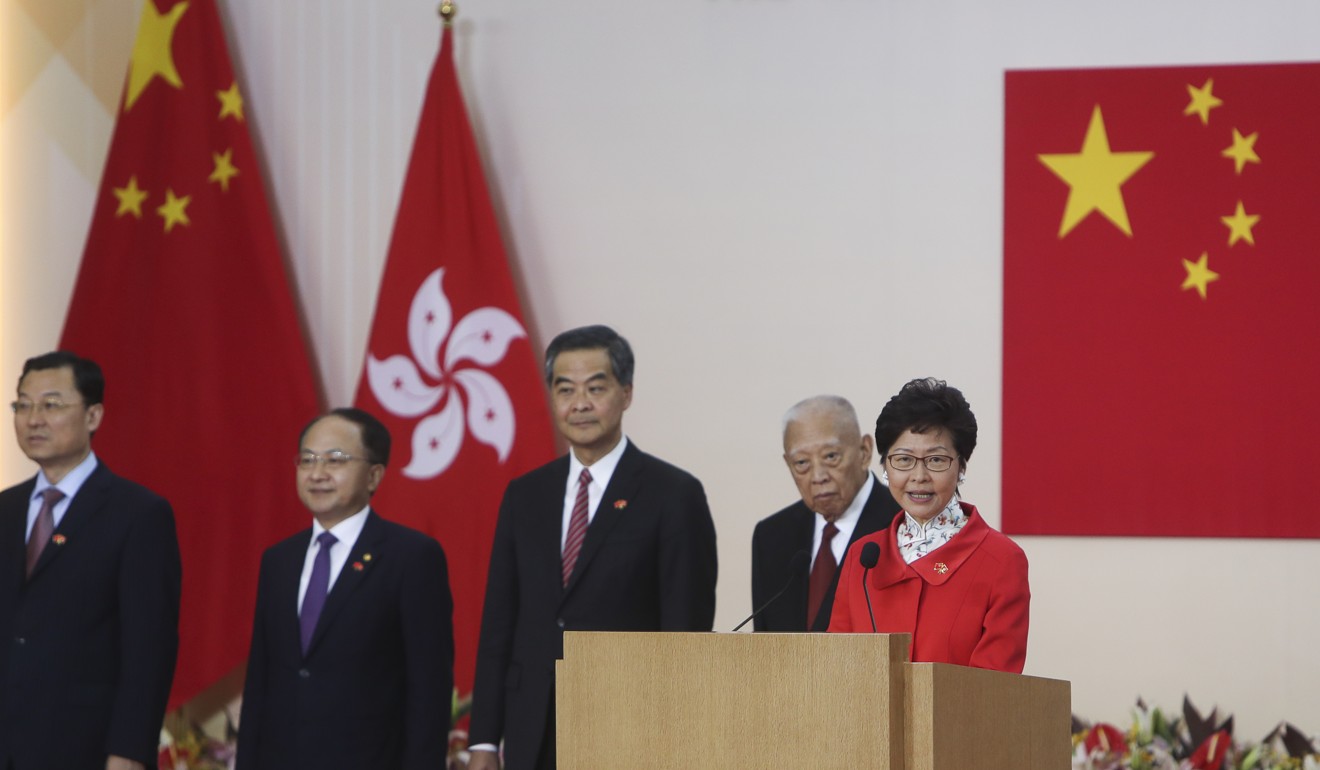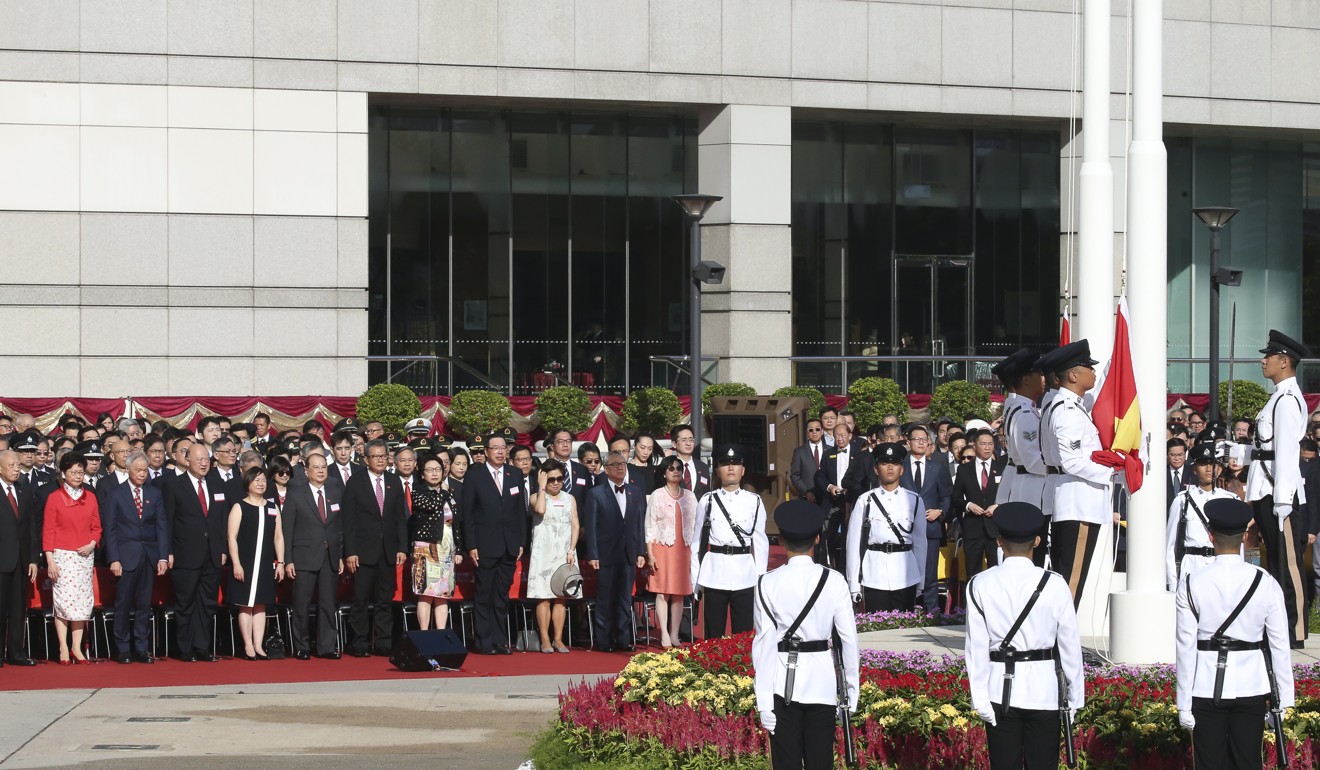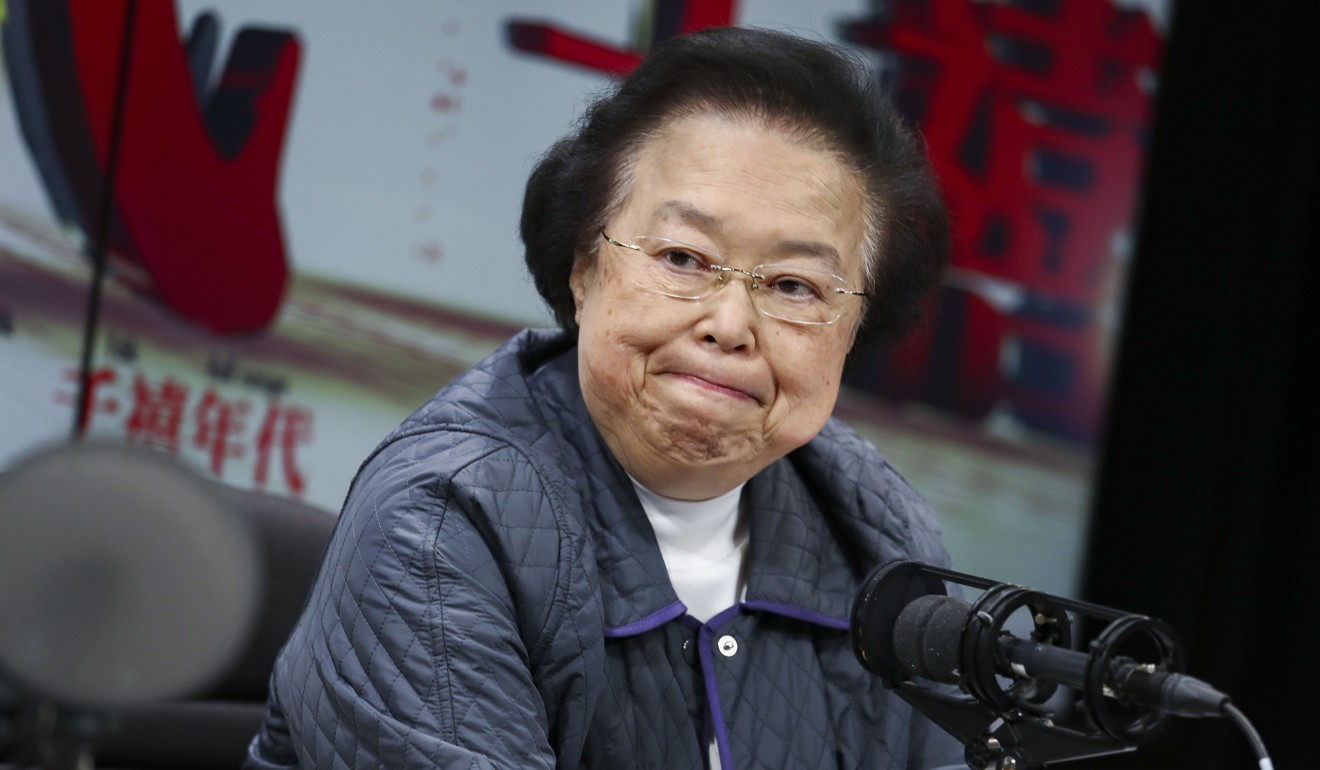
Hong Kong leader predicts bright future for city and claims public trust in government has been rebuilt
Chief Executive Carrie Lam gives upbeat assessment of her first year in office at ceremony marking 21st anniversary of return to Chinese rule
Hong Kong’s leader Carrie Lam Cheng Yuet-ngor has predicted a bright future for the city under her guidance, while claiming public trust in the government has been rebuilt and rational discussion restored in the Legislative Council.
Speaking on Sunday as Hong Kong marked the 21st anniversary since Britain handed the city back to China, the chief executive gave an upbeat assessment of her first year in office, and painted a rosy picture of the future, as long as Hongkongers stood united behind her.
“After a year of leading the government to demonstrate a new style of governance, perform new roles and implement a new fiscal philosophy, I have greater confidence in Hong Kong,” she said at the Hong Kong Convention and Exhibition Centre in Wan Chai after the flag-raising ceremony.
“As long as we remain focused and stand united, I am sure that the best is yet to come for Hong Kong.”

Not far from the ceremony about 20 members from the League of Social Democrats, led by party leader “Long Hair” Leung Kwok-hung, marched from Wan Chai to the Golden Bauhinia Square before the flag-raising.
Although police stopped them from entering the square, they chanted and held up placards calling for the “end of one-party dictatorship” and the release of Liu Xia, the wife of late Nobel Peace laureate Liu Xiaobo, who has called for sweeping political reforms in China.
The laureate died in July last year of multiple organ failure after he was sentenced to 11 years behind bars in 2009 for “inciting subversion of state power”.
Carrie Lam’s first year a positive change but more must be done
Last year, Carrie Lam became the city’s first female chief executive. She received 777 votes from the 1,194-member Election Committee, composed mostly of Beijing loyalists.
According to the University of Hong Kong’s public opinion programme, her support rating in her first month in office was 61 out of 100.
It dropped to 54.3 last month, which was still higher than the support rating of 46.4 that her predecessor, Leung Chun-ying, enjoyed a year into his time as the city’s leader.
In her assessment of her first year in charge, Lam said her administration had adopted a “we care”, “we listen” and “we act” approach, which “has brought about relative stability in society, restored room for rational discussion rather than personal attacks in the Legislative Council, and rebuilt trust in the government”.
Hong Kong’s controversial China rail checkpoint bill finally passed by lawmakers amid protests, delays and expulsions
Last December, after weeks of antagonism between opposing camps of lawmakers, and a dramatic day where 11 pan-democrats were booted out of the chamber for disrupting the ongoing debate, 24 amendments to the Legislative Council’s rule book were passed.
The changes, proposed by the pro-establishment bloc to curb filibustering, were staunchly opposed by the pro-democracy camp, which said it would stop them from being an effective check on the city’s government, and allow the administration to bulldoze through controversial legislation.
The amendments were passed after a court disqualified six elected pan-democratic lawmakers for failing to take their oaths of office properly.
Since then, the veto power of the pro-democracy bloc has been significantly weakened, with the pro-establishment camp capitalising on the situation to push through the amendments.
Just last month, Legco passed a bill to set up a joint border checkpoint with mainland China in the heart of the city after a marathon debate. That bill allows for the stationing of mainland Chinese immigration officers at the West Kowloon terminal of the high-speed railway linking Hong Kong to Guangzhou.

The highlight of the new policies is that subsidised flats will be nearly 50 per cent cheaper for young couple and middle-class families.
The measures were announced on the same day government figures showed home prices in May climbing for the 26th straight month, although at a slower rate than previously.
“We hope that as a result [of the new measures], public discussion on land supply can be more focused, and citizens can expect that increasing land supply will offer opportunities for purchasing affordable homes and shorten the waiting time for improving their living conditions,” Lam said.
By sending CY Leung’s allies packing, Hong Kong leader Carrie Lam makes progress in defusing city’s political tensions
Executive Councillor Wong Kwok-kin said during Lam’s first year the overall political atmosphere in society had become less tense, while the relationship between the legislature and executive branches had also improved.
However, he warned long-standing problems such as housing had not yet been fully resolved.
“The outstanding debts include land and housing problems,” he said.
Meanwhile, Basic Law Committee vice-chairwoman Maria Tam Wai-chi, praised the chief executive’s courage in tackling the housing issue with the roll out of new, ambitious policies last week.
“I’m very pleased to see such a breakthrough,” she said.

The chief executive also said the “four imperatives” President Xi Jinping gave Hong Kong when he visited the city last year had “created the exceptionally favourable ground for the government to lead Hong Kong in accordance with the law, assume a proactive role, develop the economy and improve people’s livelihood”.
In the four imperatives, Xi stressed the importance of a proper understanding of the relationship between “one country, two systems”, the principle under which China rules the city.
Under the Basic Law, the city’s mini-constitution, Hong Kong enjoys a high degree of autonomy, but incidents such as the booksellers’ saga – in which people selling books critical of the Chinese government were kidnapped by Chinese agents in Hong Kong, the mainland and Thailand – has sparked fears the city’s autonomy is being eroded.
Beijing’s meddling in Hong Kong affairs through the city’s liaison office has eased under Carrie Lam but experts warn she still needs to tread carefully
“During the past year, the [Hong Kong] government upheld the principle of one country by
maintaining an absolutely clear stance when it comes to black and white issues, and showing no tolerance for any act that would hit our country’s bottom line,” Lam said.
She added she had always heard people describing the term of the government as having a “good start”.
“To sustain the situation, we must never forget our aspiration for the full and faithful implementation of one country, two systems,” Lam said. “We must maintain our confidence in the rule of law and unique advantages of [Hong Kong].”
The People’s Daily, the Communist Party’s mouthpiece, said in an article on Sunday that Hong Kong’s political status quo had increasingly been stabilised. It also said more Hong Kong officials have looked at different issues from the country’s perspective, and have fulfilled their responsibilities to the country.
Additional Reporting by Ernest Kao

